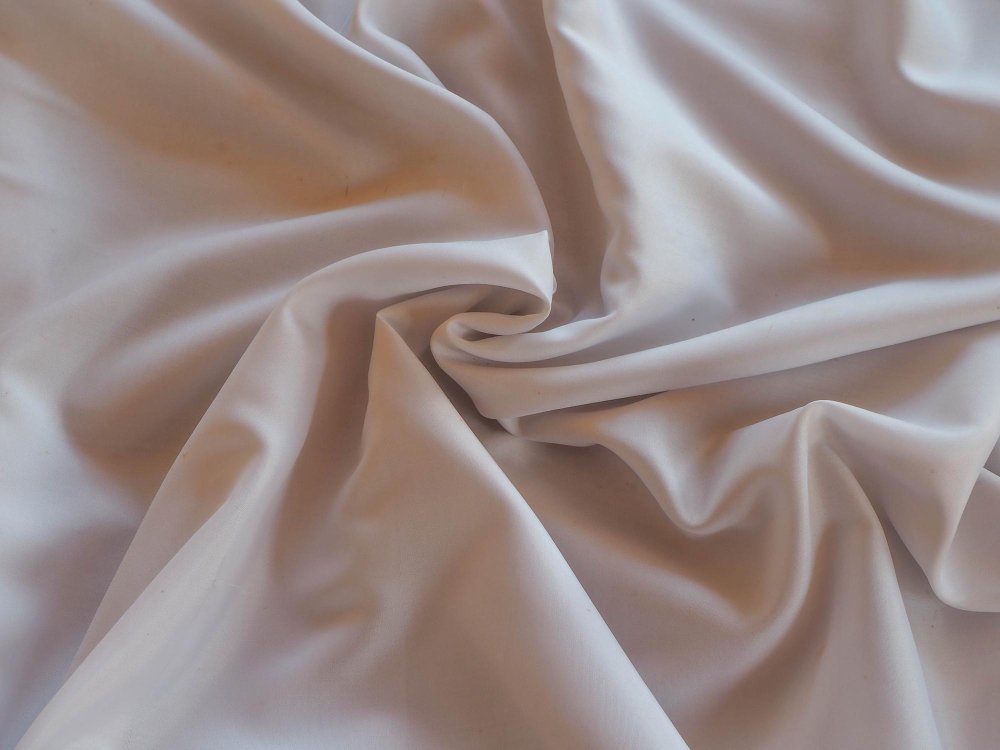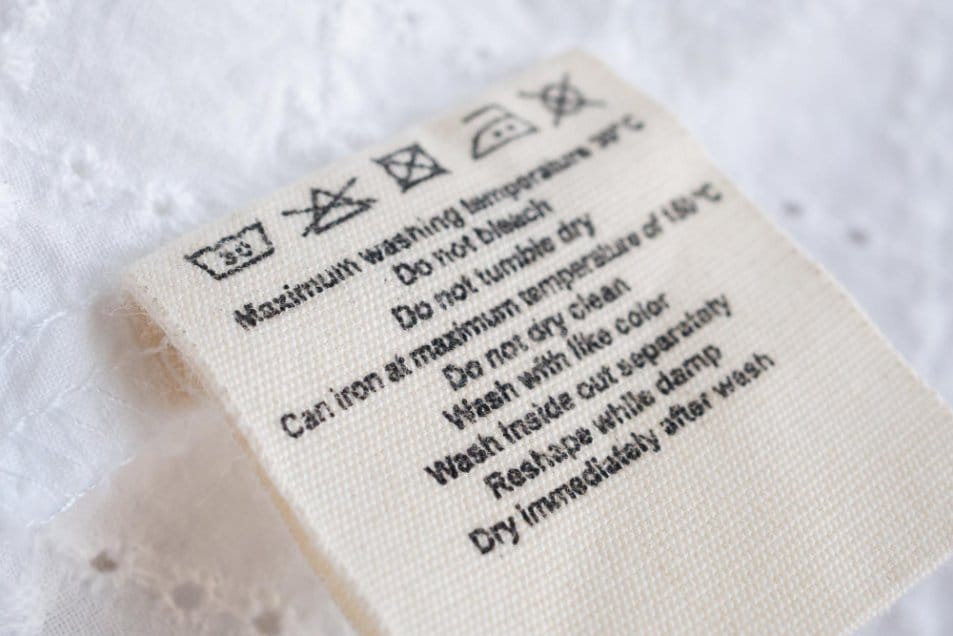Table of Contents
- What is Sateen Cotton?
- Understanding the Sateen Weave
- The Truth About Thread Count
- Best Sateen Cotton Sheets 2025
- Benefits and Drawbacks
- Sateen vs Other Cotton Types
- What Certifications Matter
- Guide for Hot Sleepers
- Care and Maintenance
- Troubleshooting Common Issues
- Smart Shopping Guide
- Frequently Asked Questions
Key Takeaway
Sateen cotton sheets offer a perfect balance of luxury and practicality. The unique weaving technique creates a silk-like surface while maintaining cotton’s natural breathability and durability. With proper care, quality sateen sheets can last 5-10 years while getting softer with each wash.
What is Sateen Cotton?
Sateen cotton refers to 100% cotton fabric woven using a specific technique that creates a smooth, lustrous surface. Unlike regular cotton, sateen uses a “satin weave” where threads float over multiple strands before weaving under, typically in a four-over-one-under pattern.
This weaving method places more threads on the fabric’s surface, resulting in that signature silky feel and subtle sheen that makes sateen so desirable for premium cotton bedding.
What’s the Difference Between Sateen and Satin?
This is one of the most common questions about bedding, and the confusion is understandable since both fabrics look and feel similar. Here’s the key distinction:
| Aspect | Sateen | Satin |
|---|---|---|
| Material | 100% cotton fibers | Silk, polyester, or synthetic fibers |
| Weave Type | Satin weave applied to cotton | Satin weave (original) |
| Breathability | Excellent (natural cotton) | Limited (synthetic) or good (silk) |
| Durability | Very good, improves with washing | Varies by material quality |
| Care Requirements | Machine washable | Often dry clean only |
| Price Range | $50-$400 | $30-$300+ (depending on material) |
| Hypoallergenic | Yes (natural cotton) | Depends on material |
In simple terms: Sateen is cotton fabric woven like satin, while satin refers to the weaving technique itself and can be made from various materials including silk, polyester, or rayon. Sateen offers the luxurious feel of satin with cotton’s practical benefits like breathability and easy care.
Is Sateen Natural or Synthetic?
Sateen is completely natural when made from 100% cotton fibers. The term “sateen” describes the weaving technique, not the material itself. However, some manufacturers create sateen-weave fabrics using synthetic fibers, so always check the label to ensure you’re getting genuine cotton sateen.
Is Sateen Pure Cotton?
High-quality sateen sheets are made from 100% cotton. However, some budget options may blend cotton with polyester or other synthetic fibers. Pure cotton sateen offers better breathability, durability, and comfort compared to blended versions.
Understanding the Sateen Weave
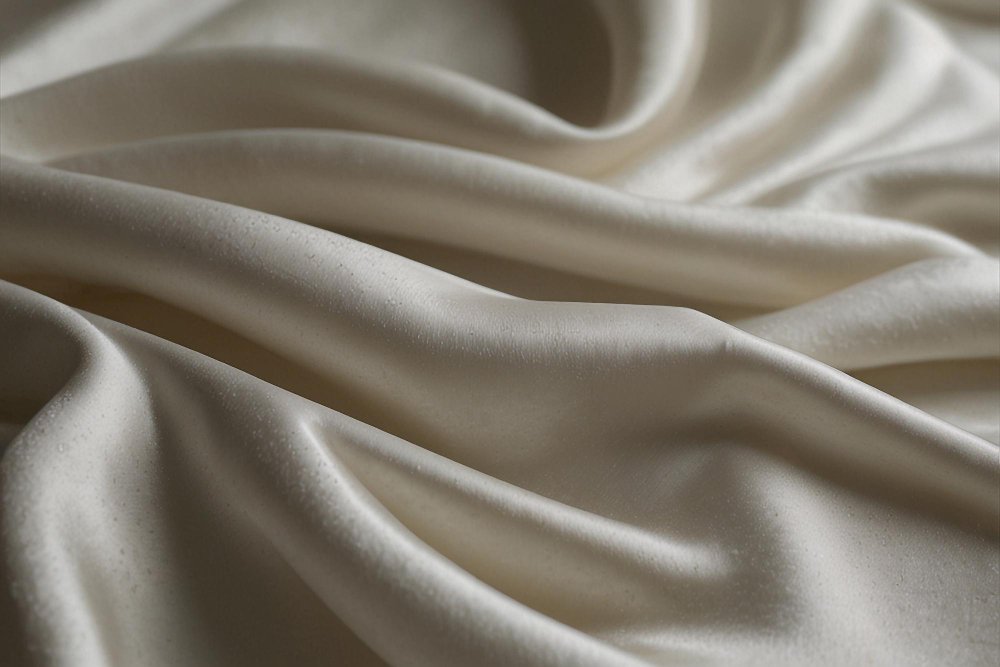
The magic of sateen lies in its weaving technique. Master weavers create the signature sheen using a four-over-one weave pattern, where vertical yarns pass under four horizontal threads before looping back. This method produces 30% more thread coverage than basic plain weave fabrics.
Different Types of Sateen Cotton
| Type | Key Features | Best For | Price Range |
|---|---|---|---|
| Egyptian Cotton Sateen | Extra-long fibers, premium quality | Luxury seekers | $200-$800 |
| Organic Cotton Sateen | Chemical-free, GOTS certified | Eco-conscious buyers | $150-$400 |
| Pima Cotton Sateen | Long-staple, durable | Value seekers | $100-$300 |
| Supima Cotton Sateen | American-grown premium cotton | Quality conscious | $150-$500 |
What Does Sateen Fabric Feel Like?
Sateen fabric feels remarkably smooth and silky to the touch, with a luxurious drape that’s heavier than percale but lighter than flannel. The surface has a subtle sheen that catches light beautifully, while the reverse side maintains a matte finish for versatile styling options.
The Truth About Thread Count in Sateen Sheets
Thread Count Myths Debunked
Higher thread count doesn’t automatically mean better quality. Many manufacturers manipulate thread count by using multi-ply yarns, essentially cheating the system by counting multiple thin strands as separate threads.
What Thread Count is Best for Cotton Sateen?
For sateen sheets, the sweet spot is between 300-600 thread count using single-ply yarns. According to the Global Organic Textile Standard (GOTS), fiber quality matters more than thread count alone. Here’s what different ranges offer:
- 250-300: Average quality, good for budget-conscious buyers
- 300-400: Good balance of softness and breathability
- 400-600: Premium quality, maximum durability
- 600+: Often overpriced, may trap heat
- 1000+: Usually misleading multi-ply construction
Remember, Egyptian cotton and other long-staple varieties can achieve superior softness even at lower thread counts due to their longer, stronger fibers.
Need help calculating the right thread count for your needs?
Try Our Cotton Care CalculatorBest Sateen Cotton Sheets 2025
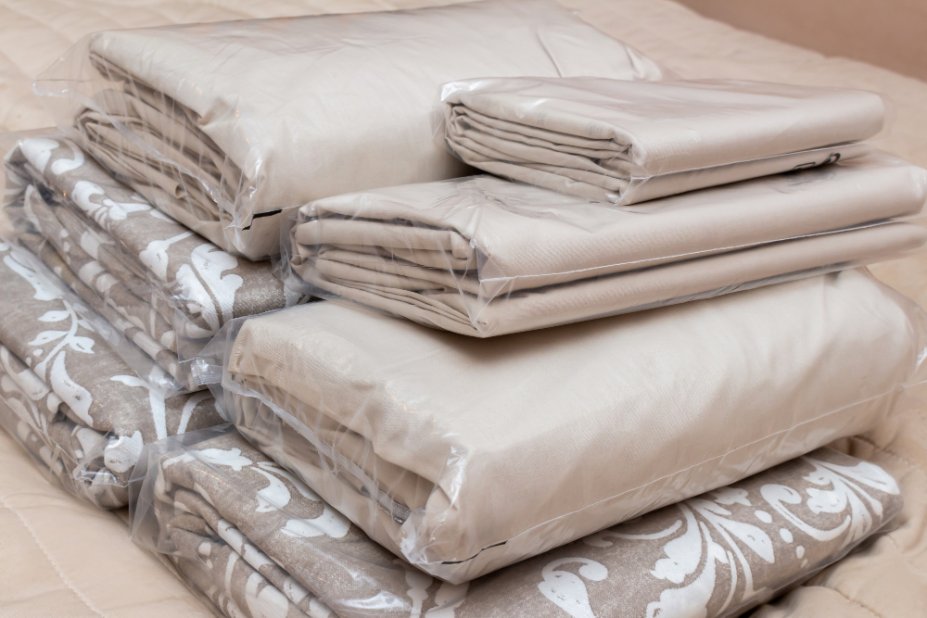
Editor’s Choice: Saatva Organic Sateen Sheet Set
Price: $275 (Queen)
Thread Count: 300
Why We Love It: GOTS certified organic cotton with exceptional breathability. Perfect for year-round use and hot sleepers. The lightweight feel doesn’t compromise on luxurious softness.
Certifications: GOTS, Fair Trade, OEKO-TEX
Best Value: California Design Den 400 Thread Count Sateen Sheet Set
Price: Under $100 (Queen)
Thread Count: 400
Why We Love It: Exceptional quality at an unbeatable price. Substantial feel that testers loved, with excellent pilling resistance in lab tests.
Best For: Budget-conscious shoppers who won’t compromise on comfort
Luxury Pick: Peacock Alley Soprano Sateen Sheet Set
Price: $455 (Queen)
Thread Count: 420
Why We Love It: Extra-long staple cotton creates an incredibly buttery-soft feeling. Available in seven beautiful colors with OEKO-TEX certification.
Best For: Those seeking ultimate luxury and don’t mind the investment
Best Color Selection: Brooklinen Luxe Core Sheet Set
Price: $159-$219 (Queen)
Thread Count: 480
Why We Love It: Available in 12+ colors including limited editions. Convenient “short” and “long” labels on fitted sheets make bed-making effortless.
Best For: Design-conscious shoppers who want style options
Benefits and Drawbacks of Sateen Cotton
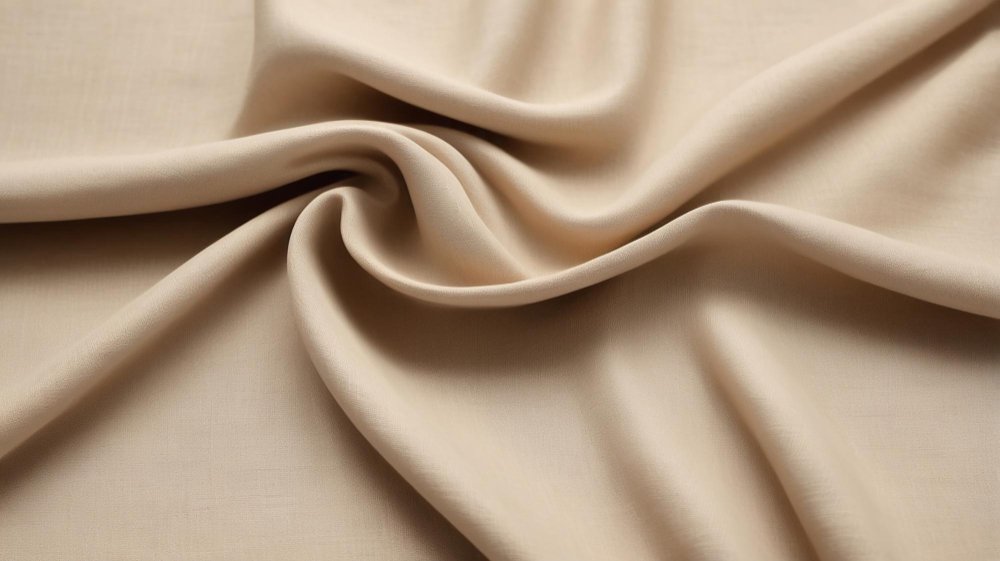
Advantages of Sateen Cotton
- Luxurious Feel: Silky surfaces rival high-end satin at a fraction of the cost
- Year-Round Comfort: Dense weave traps warmth in cooler months yet remains breathable
- Exceptional Durability: Withstands 300+ wash cycles without significant thinning
- Gets Softer Over Time: Improves with each wash, developing richer texture
- Wrinkle Resistant: Naturally drapes well and resists creasing
- Hotel-Quality Appearance: Lustrous finish creates an elegant bedroom aesthetic
Disadvantages of Sateen Cotton
- Initial Wrinkling: May crease after laundering, requiring steaming
- Potential Pilling: High-friction areas like pillowcases may develop small fiber balls
- Requires Gentle Care: Benefits from specific washing techniques
- Higher Cost: Premium quality comes with a higher price tag
- Heat Retention: May be too warm for very hot sleepers
- Can Be Slippery: Some find the smooth surface too slick
Is Sateen Good for Skin?
Yes, sateen cotton is excellent for sensitive skin. The smooth surface reduces friction that can cause irritation, while natural cotton fibers are hypoallergenic and breathable. The tight weave also prevents dust mites from penetrating the fabric.
Is Cotton Sateen Itchy?
Quality cotton sateen should never feel itchy. If your sateen sheets feel scratchy, it’s likely due to lower-grade cotton, chemical treatments, or improper washing. High-quality sateen becomes progressively softer with each wash.
Sateen vs Other Cotton Types
Cotton Sateen vs Egyptian Cotton
This comparison often confuses shoppers because Egyptian cotton can be woven into sateen. Egyptian cotton refers to the fiber origin and quality, while sateen describes the weaving technique.
| Feature | Egyptian Cotton | Sateen Weave | Egyptian Cotton Sateen |
|---|---|---|---|
| Price Range | $200-$800 | $40-$600 | $300-$1000+ |
| Break-in Period | 5-10 washes | Immediate softness | 3-5 washes |
| Heat Retention | Low | Moderate | Low-Moderate |
| Durability | Excellent | Very Good | Outstanding |
Which is Better: Cotton Percale or Cotton Sateen?
The choice depends on your sleep preferences:
- Choose Percale if: You sleep hot, prefer crisp textures, live in warm climates, or like a hotel-fresh feeling
- Choose Sateen if: You want silky smoothness, sleep cool, prefer luxurious drape, or have sensitive skin

Watch this detailed comparison between percale and sateen sheets to understand which weave suits your sleep style.
Is Egyptian Cotton Always Sateen?
No, Egyptian cotton can be woven into percale, sateen, or other weave patterns. The term “Egyptian cotton” refers only to the fiber source and length, not the weaving technique.
Are Bamboo Sheets Better Than Sateen?
Bamboo sheets excel in moisture-wicking and temperature regulation, making them ideal for hot sleepers. However, cotton sateen offers better durability, a more traditional feel, and often superior construction quality. Organic cotton sateen provides an eco-friendly middle ground.
What Certifications Matter

GOTS Certified
Gold standard for organic cotton with strict chemical regulations and ethical practices throughout the supply chain. Learn more at GOTS official site.
OEKO-TEX Standard 100
Tests for over 1,000 harmful substances and allergens, ensuring safety for you and your family. Verified by OEKO-TEX.
MADE SAFE
Extremely stringent certification screening 6,500+ banned substances for ultimate safety.
Fair Trade Certified
Ensures ethical working conditions and fair compensation for cotton farmers and factory workers.
Is Sateen Healthy?
Quality sateen cotton is very healthy for sleep. Natural cotton fibers are hypoallergenic, breathable, and don’t trap allergens. Look for GOTS or OEKO-TEX certified options to ensure no harmful chemicals were used in processing.
Is Cotton Sateen Good for Allergies?
Yes, cotton sateen is excellent for allergy sufferers. The tight weave prevents dust mites from penetrating the fabric, while natural cotton fibers don’t harbor allergens like synthetic materials can. Choose organic options for maximum hypoallergenic benefits.
Guide for Hot Sleepers
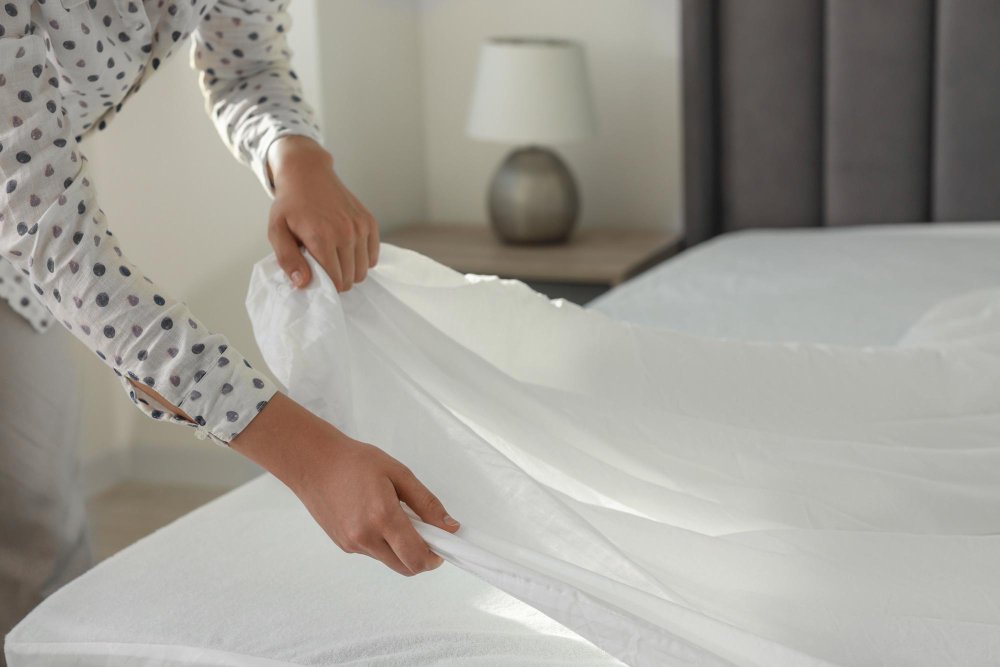
While sateen can trap more heat than percale, the right sateen sheets can work for hot sleepers with careful selection:
Best Sateen Options for Hot Sleepers
- Lower Thread Count: Stay between 300-400 for maximum breathability
- Organic Options: GOTS certified organic cotton often has better airflow
- Lightweight Constructions: Look for brands that specifically mention “lightweight sateen”
- Long-Staple Cotton: Egyptian or Pima cotton allows for looser weaves while maintaining strength
Is Cotton Sateen Hot to Sleep On?
Sateen can be warmer than percale due to its denser weave, but quality sateen sheets made from breathable cotton with appropriate thread counts (300-400) can still work for most sleepers. Very hot sleepers may prefer percale or bamboo alternatives.
Is Cotton Sateen Good for Night Sweats?
For severe night sweats, percale or bamboo sheets may be better choices. However, lightweight organic sateen with lower thread counts can work for mild to moderate night sweats, especially when combined with cooling mattress toppers and proper room temperature control.
Care and Maintenance
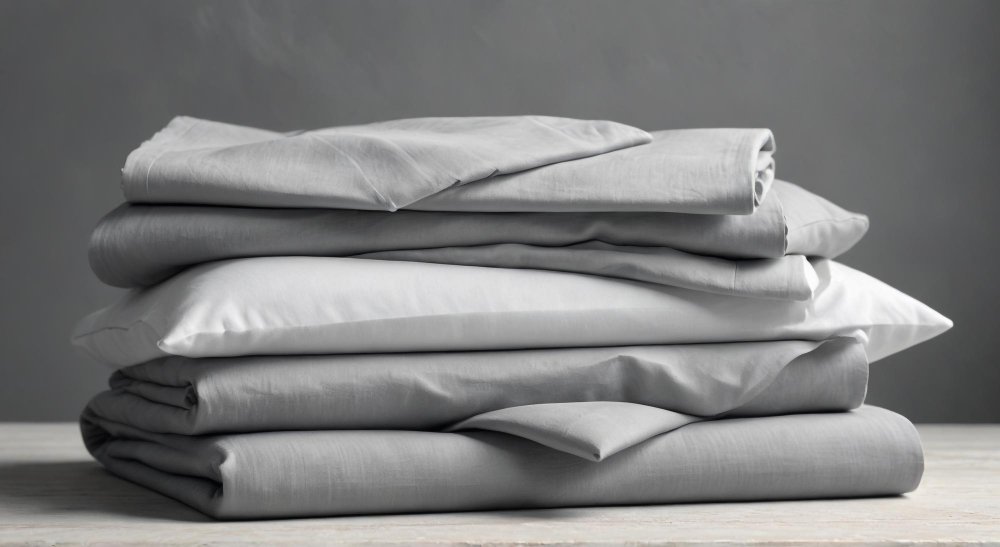
Washing Best Practices
- Use Cold Water: Keep temperature under 104°F (40°C) to prevent fiber breakdown
- Choose Mild Detergent: Avoid harsh chemicals that can damage the weave
- Don’t Overcrowd: Sheets need space to move freely during washing
- Skip Fabric Softeners: These clog fibers and reduce breathability
- Wash Weekly: Regular washing prevents body oils from breaking down fibers
Drying Guidelines
- Line Dry When Possible: Air drying in shade prevents sun damage
- Use Low Heat if Machine Drying: High heat weakens cotton fibers
- Remove Promptly: Prevents deep wrinkles from setting
- Shake Before Drying: Helps prevent wrinkles and maintains shape
Can I Tumble Dry Cotton Sateen?
Yes, but use low heat settings and remove while slightly damp to minimize wrinkles. High heat can weaken fibers and cause shrinkage.
Does Cotton Sateen Shrink After Washing?
Quality pre-shrunk sateen cotton should shrink minimally (2-3%) after the first wash. Always check care labels and consider sizing up if you’re between mattress depths.
Storage Tips
- Store in breathable cotton bags, not plastic
- Alternate fold lines to prevent permanent creases
- Keep in cool, dry places away from direct sunlight
- Rotate between two sets to extend lifespan
How Long Do Sateen Sheets Last?
High-quality cotton sateen sheets can last 5-10 years with proper care. Signs it’s time to replace include thinning fabric, persistent pilling, or loss of softness that doesn’t improve with washing.
Need personalized care instructions for your specific sheets?
Get Custom Care GuidelinesTroubleshooting Common Issues
Why Are My Sateen Sheets Rough?
Rough sateen sheets usually result from fabric softener buildup, hard water deposits, or overwashing with harsh detergents. Try washing with white vinegar (1/2 cup) to remove buildup, then switch to gentler detergents.
Do Cotton Sateen Sheets Pill?
Quality sateen should resist pilling, but lower-grade cotton or excessive friction can cause it. Wash in cold water, avoid overloading the machine, and separate from rough fabrics like towels.
Is Cotton Sateen Slippery?
The smooth surface can feel slippery initially, but this usually improves after a few washes. If it remains too slick, consider percale weave or look for sateen with slightly lower thread counts.
Do Sateen Sheets Need Ironing?
Sateen is naturally more wrinkle-resistant than percale, but some pressing may be needed after washing. Use medium heat with steam, or hang immediately after drying to minimize wrinkles.
Does Cotton Sateen Crease Easily?
Sateen creases less than percale but more than jersey knits. The dense weave helps resist wrinkles, but proper drying and storage techniques minimize creasing.
Does Sateen Snag Easily?
The smooth surface makes sateen less prone to snags than rougher weaves. However, avoid jewelry, rough fingernails, or pet claws that can catch and pull threads.
Smart Shopping Guide
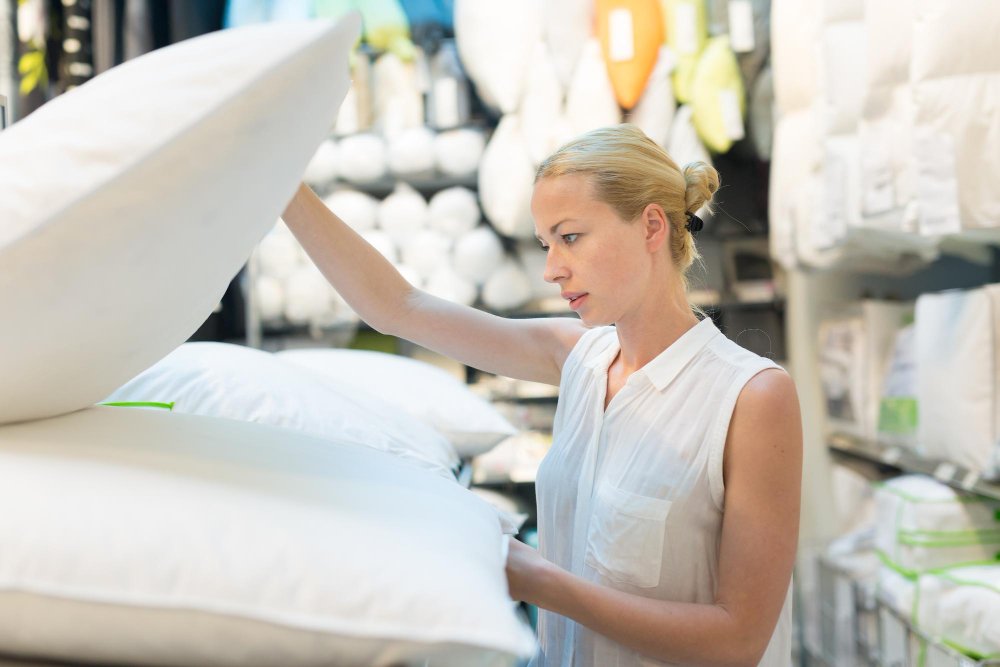
What to Look For When Buying
- Fiber Length: Long-staple cotton (Egyptian, Pima, Supima) creates stronger, smoother threads
- Single-Ply Construction: Avoid multi-ply threads that inflate thread count artificially
- Proper Thread Count: 300-600 for sateen, avoid anything over 800
- Deep Pockets: At least 15-16 inches to accommodate modern thick mattresses
- Return Policies: Look for 30+ night sleep trials to test comfort
- Reinforced Corners: Quality construction prevents fitted sheet slippage
Price Ranges and What to Expect
| Price Range (Queen) | Quality Level | Expected Features | Lifespan |
|---|---|---|---|
| Under $100 | Budget | Basic cotton, standard weave | 2-3 years |
| $100-$200 | Mid-Range | Long-staple cotton, good construction | 3-5 years |
| $200-$400 | Premium | Organic/Egyptian cotton, certifications | 5-7 years |
| $400+ | Luxury | Finest materials, hand-finished details | 7-10 years |
When to Buy Sateen Sheets
The best times to purchase quality bedding:
- January: Post-holiday sales and white sales
- May: Spring cleaning promotions
- August: Back-to-school bedding sales
- November: Black Friday and pre-holiday deals
Red Flags to Avoid
- Thread counts over 1000 (usually multi-ply manipulation)
- Prices that seem too good to be true for premium cotton
- No return policy or sleep trial
- Vague fiber descriptions (avoid “cotton blend” without specifics)
- No care instructions or certifications listed
Environmental Impact Considerations
Sustainable sateen cotton options offer environmental benefits. According to Textile Exchange’s 2024 Materials Market Report, organic cotton production has shown steady growth, with sustainability programs now accounting for 28% of all cotton produced globally:
- Organic Cotton: Uses 91% less water than conventional cotton
- GOTS Certification: Ensures sustainable farming and ethical labor practices
- Longevity: Quality sheets lasting 5-10 years reduce textile waste
- Natural Fibers: Biodegradable at end of life, unlike synthetic alternatives
Want to compare cotton types for your project?
Use Our Fabric Selector ToolWorking with Sateen Cotton
Is Cotton Sateen Hard to Sew With?
Cotton sateen is actually quite pleasant to sew with due to its stable weave and smooth surface. The fabric doesn’t fray as easily as looser weaves, making it forgiving for beginners.
What Can I Sew with Cotton Sateen?
Sateen cotton works beautifully for:
- Bedding and pillowcases
- Luxury curtains and drapes
- Formal blouses and shirts
- Linings for jackets and coats
- Special occasion garments
- Home decor projects requiring drape

Watch this creative sewing project using cotton sateen fabric for pajamas – perfect example of sateen’s versatility!
For more sewing guidance, check out our beginner’s guide to sewing or learn about essential sewing supplies.
Is Cotton Sateen Stretchy?
Pure cotton sateen has minimal stretch compared to stretchy fabrics. Some manufacturers add 2-3% elastane for slight stretch, but traditional sateen relies on the weave’s natural drape rather than elasticity.
Hotel-Quality Sleep at Home
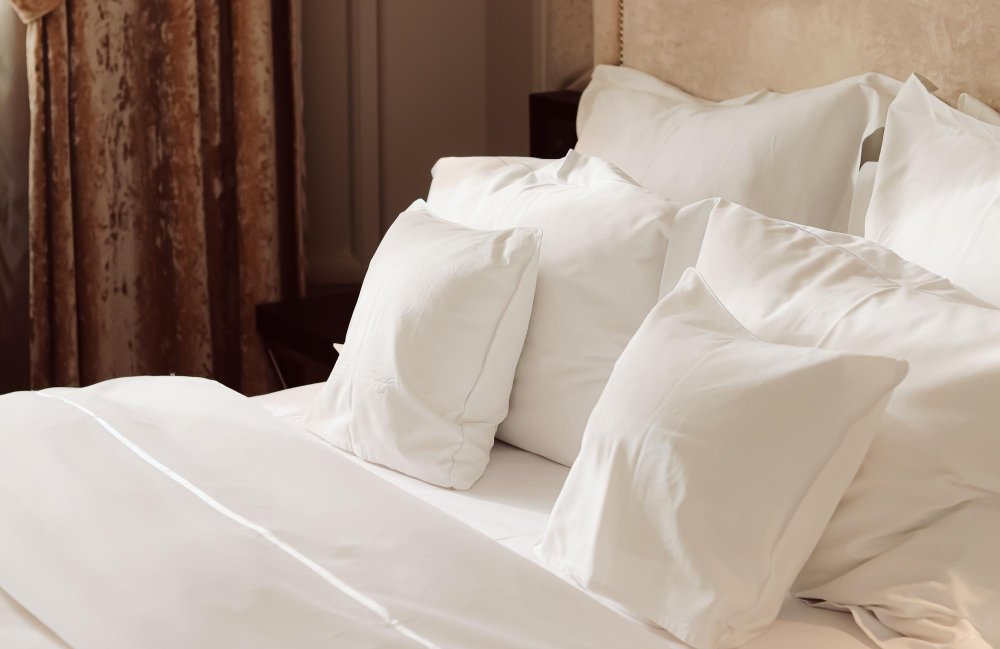
Do Hotels Use Cotton Sateen?
Many luxury hotels prefer sateen sheets for their guest rooms because of the smooth, elegant feel and lustrous appearance. The durability also makes them cost-effective for commercial laundry operations.
Do Hotels Use Percale or Sateen Sheets?
Hotel preferences vary:
- Luxury Hotels: Often choose sateen for its upscale appearance and guest comfort
- Business Hotels: May prefer percale for easier care and cooling properties
- Warm Climate Hotels: Typically use percale for better temperature regulation
- Resort Hotels: Often mix both, using sateen in suites and percale in standard rooms
Achieving Hotel-Quality Sleep
To replicate luxury hotel comfort:
- Choose white or neutral colors for a classic hotel aesthetic
- Invest in quality pillows and mattress toppers
- Layer with a lightweight blanket and duvet
- Maintain consistent washing and care routines
- Replace sheets every 5-7 years to maintain peak comfort
Frequently Asked Questions
Conclusion
Sateen cotton sheets represent the perfect marriage of luxury and practicality in modern bedding. The specialized weaving technique transforms ordinary cotton into a silk-like sleeping surface while preserving all the natural benefits cotton is known for – breathability, durability, and hypoallergenic properties.
Key Takeaways for Buyers
Quality Matters More Than Thread Count: Focus on single-ply construction, long-staple cotton (Egyptian, Pima, or Supima), and reputable certifications rather than chasing high thread count numbers. The sweet spot for sateen remains 300-600 thread count with quality fibers.
Sateen Works for Most Sleep Styles: While very hot sleepers might prefer percale, modern lightweight sateen constructions with organic cotton can accommodate most temperature preferences. The key is choosing appropriate thread counts and quality materials.
Investment in Longevity: Quality sateen sheets may cost more upfront, but their 5-10 year lifespan and improving softness over time make them excellent value. Budget options under $100 can still provide good performance if you focus on construction quality over marketing claims.
Our Recommendations
For Most Buyers: Start with the Saatva Organic Sateen Sheet Set if your budget allows. The GOTS certification, 300-thread count, and excellent breathability make it ideal for year-round comfort.
For Budget-Conscious Shoppers: The California Design Den 400 Thread Count set offers exceptional quality under $100, proving you don’t need to spend a fortune for comfortable sleep.
For Luxury Seekers: Invest in Egyptian cotton sateen from established manufacturers like Peacock Alley or Brooklinen, focusing on craftsmanship and certifications over thread count alone.
Final Thoughts
The journey to better sleep often starts with better bedding. Sateen cotton sheets offer an accessible entry point into luxury sleeping without the maintenance requirements of silk or the cost of high-end alternatives. With proper care – cold water washing, gentle detergents, and appropriate drying techniques – your sateen sheets will improve with age, becoming softer and more comfortable over years of use.
Remember that great sleep is an investment in your health, productivity, and overall quality of life. Whether you choose organic options for environmental consciousness, Egyptian cotton for ultimate luxury, or budget-friendly alternatives for practical comfort, the key is selecting sheets that match your sleep preferences, care routine, and lifestyle needs.
Take advantage of sleep trials when available, and don’t hesitate to invest in quality bedding that will serve you well for years to come. Your sleep quality – and your mornings – will thank you for making the upgrade to premium sateen cotton sheets.

